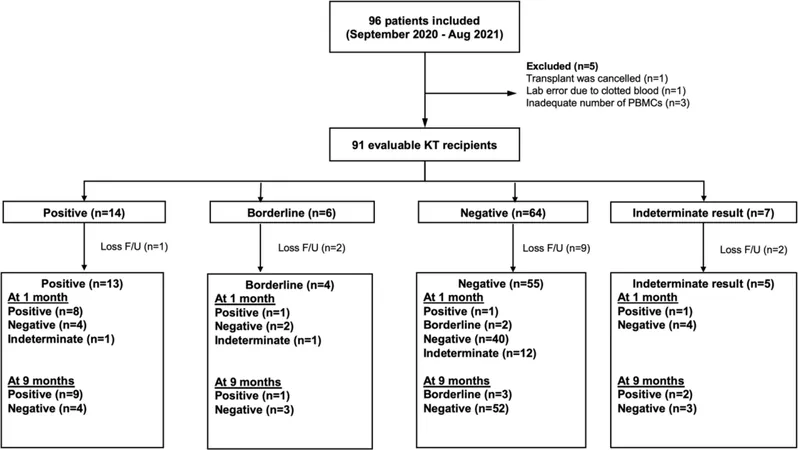
The Critical Role of Interferon-Gamma Release Assays in Assessing Latent Tuberculosis in Kidney Transplant Recipients: What You Need to Know!
2024-10-07
Author: Jia
Overview
In areas where tuberculosis (TB) is prevalent, the reactivation of TB poses a significant risk for kidney transplant recipients. A recent study sheds light on the prevalence of latent TB infection (LTBI) among these vulnerable individuals and how interferon-gamma release assay (IGRA) can be instrumental in monitoring their health post-transplant.
Study Insights
Conducted from September 2020 to August 2021, the study focused on kidney transplant recipients who underwent a standardized 9-month isoniazid prophylaxis. Researchers sought to assess LTBI status before and after the transplant through the T-SPOT.TB IGRA test.
Key Findings:
Demographics: Among the 91 patients studied, the average age was 45 years, with a significant portion (41%) being female. Most patients received transplants from deceased donors (75%).
Prevalence of LTBI: Out of those evaluated, 23.8% were found to have LTBI, with older age being a significant risk factor (p = 0.03).
Monitoring Results: Monitoring revealed that 5.4% of patients initially testing negative for LTBI converted to positive status post-transplant, with one case developing active pulmonary TB just a week after the procedure.
Dynamic Changes: Among patients with positive IGRA results, only a small fraction remained positive after nine months—indicating a variability in TB immunity post-transplant.
The Risk of Tuberculosis in Kidney Transplant Patients
The statistics are alarming: the incidence of post-transplant TB can soar to 15% in high-burden regions such as Asia. This becomes critical in developing countries, where the healthcare infrastructure may struggle to respond effectively. In fact, the reported incidence in some institutions not using prophylaxis is as high as 4%.
Why It Matters: TB not only threatens patient health post-transplant but also poses considerable morbidity and mortality risks due to the patients' weakened immune systems from immunosuppressive therapies.
Prevention Strategies
Despite guidelines recommending screenings for LTBI before transplantation, many institutions in resource-limited settings face obstacles due to economic constraints or limited access to diagnostic tests. Experts suggest that universal isoniazid prophylaxis could mitigate risks effectively, especially in TB endemic areas, but this must be balanced against potential side effects such as hepatotoxicity.
Implications for Healthcare Providers
The study findings emphasize the importance of addressing LTBI in solid organ transplant recipients. Health professionals should prioritize pre-transplant assessments for latent TB, particularly for older patients or those at higher risk. Continuous monitoring of IGRA results post-transplant is crucial—understanding the dynamics of immune responses can help healthcare providers adapt patient management strategies effectively.
Conclusion
In high TB-endemic areas, kidney transplant recipients are at considerable risk of reactivating TB, with a significant portion affected by LTBI. Continued research and improved patient monitoring strategies using IGRA can lead to more tailored approaches in preventing active TB disease in this vulnerable group. As we strive to enhance healthcare strategies, awareness of the potentially changing nature of TB immunity post-transplant becomes vital.
Don't let TB catch you off guard! Monitor your health and discuss LTBI screening with your healthcare provider if you're undergoing or considering a kidney transplant.



 Brasil (PT)
Brasil (PT)
 Canada (EN)
Canada (EN)
 Chile (ES)
Chile (ES)
 España (ES)
España (ES)
 France (FR)
France (FR)
 Hong Kong (EN)
Hong Kong (EN)
 Italia (IT)
Italia (IT)
 日本 (JA)
日本 (JA)
 Magyarország (HU)
Magyarország (HU)
 Norge (NO)
Norge (NO)
 Polska (PL)
Polska (PL)
 Schweiz (DE)
Schweiz (DE)
 Singapore (EN)
Singapore (EN)
 Sverige (SV)
Sverige (SV)
 Suomi (FI)
Suomi (FI)
 Türkiye (TR)
Türkiye (TR)